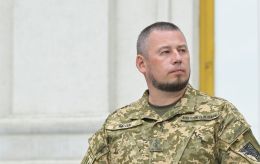'Neither scouts nor infantry can advance without us,' deminer of 93rd Brigade 'Salyut'
 Deminer "Salyut" (photo provided by the press service of the 93rd Brigade "Kholodnyi Yar")
Deminer "Salyut" (photo provided by the press service of the 93rd Brigade "Kholodnyi Yar")
About how a deminer's routine goes, what is the most difficult part of this job, and whether mine-laying drones can replace people on the front lines - read in the RBC-Ukraine article.
The commander of the demining unit of the 93rd Brigade Kholodnyi Yar, 25-year-old "Salyut" ("Salute"), has gone through Bakhmut, Okhtyrka, Balakliia, Soledar, Lyman, Izium, and many other hot combat zones during the full-scale war. He and his comrades are currently holding the defense of Klishchiivka. For his combat achievements, "Salyut" has been awarded the Badge of Honor and the Commander-in-Chief's Honorary Badge of the Armed Forces of Ukraine.
After a severe injury, the soldier received a group II disability, but he still returned to the front.
"I have three reasons to be discharged from service - disability, three minor children, and a disabled father-in-law and grandmother who need care. But if I leave, who will do my job?" says "Salyut".
RBC-Ukraine asked the soldier about the work that deminers perform on the front lines and the difficulties they face.
Below is the direct speech of the deminer "Salyut".
5 years of combat experience
I come from a military dynasty - my great-grandfather fought in the UPA (Ukrainian Insurgent Army), my grandfather in Afghanistan, my father was a career military officer but is now retired due to disability, and my mother is a medical worker at a military hospital. At first, I wanted to study psychology, but then I decided to become a commander. I graduated from the National Academy of Land Forces and specialize not only in engineering but also in chemical defense, building bunkers, trenches, observation posts, reconnaissance, and many other tasks.
I have 5 years of combat experience - during the Joint Forces Operation, I managed to complete two rotations in Sievierodonetsk and Volnovakha; during the full-scale invasion, I fought in the Donetsk, Kharkiv, and Sumy regions. They nicknamed me "Salyut" because at 25 years old, I’ve already been involved in many explosions.
I was severely wounded in the head near Balakliia. We were storming and clearing positions, checking trenches. My helmet was pierced through. The doctors had to break my skull into four pieces and reassemble it, with 27 stitches applied. That same day, I wanted to return to my comrades, but the medics asked me to at least wait until morning. After recovering, I went back to the front.
Now it’s hard for me to wear a bulletproof vest and go on missions. My main task is to plan everything correctly so that the mission is successful and the guys come back alive.
.jpg)
Deminer "Salyut" (photo provided by the press service of the 93rd Brigade "Kholodnyi Yar")
Extraordinary days of a deminer
An ideal deminer must possess great willpower, an understanding of the tasks at hand, and be knowledgeable in electronics, mechanisms, and the principles of how mines operate. They must be able to read maps for laying mines and also know how to use standard weapons.
Deminers work both on the front line and in the rear or de-occupied territories. Whether we are on the offensive or defensive, the deminer always conducts reconnaissance of the area and guides the infantry into position. The men check the territory for explosive devices. Without us, neither scouts nor infantry can advance. Previously, even medics wouldn't go onto the battlefield because the Russians would booby-trap bodies and plant grenades.
We conduct a complete engineering reconnaissance of the area, constantly scanning 360 degrees around us, usually with a probe or metal detector, to ensure there are no tripwires. Infantry or snipers cover us because a deminer cannot both fight and clear mines simultaneously.
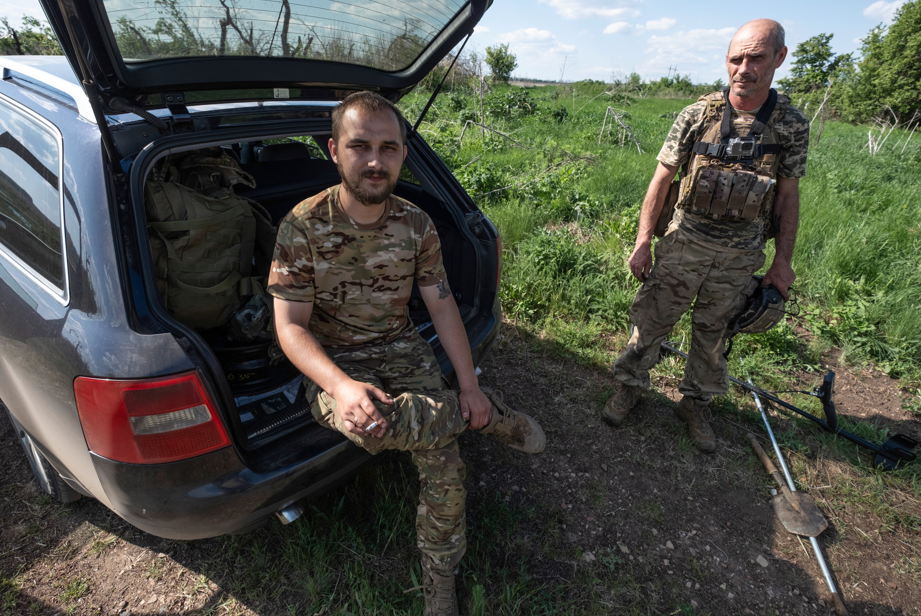
During the work, deminers are covered by infantry or snipers (photos provided by the press service of the 93rd Brigade "Kholodnyi Yar")
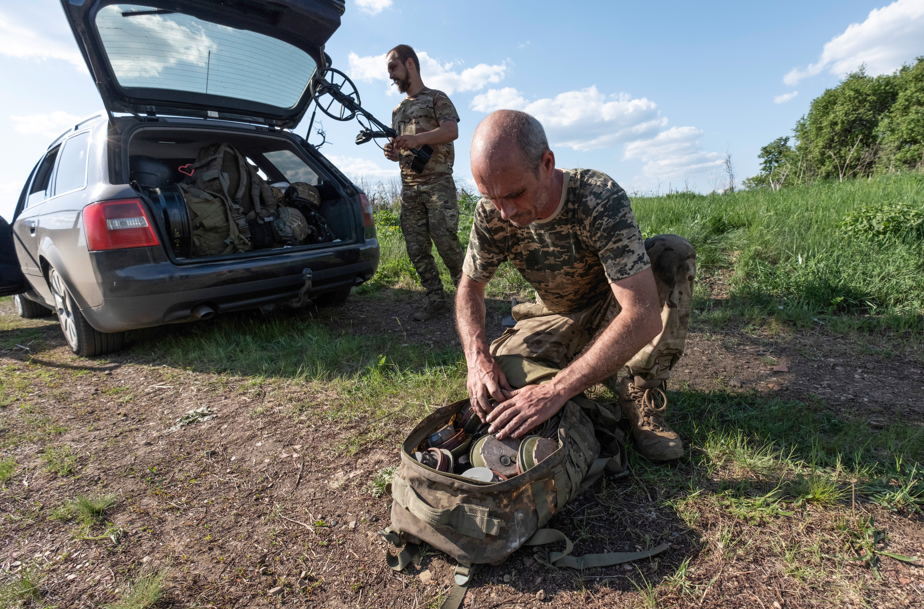
During the work, deminers are covered by infantry or snipers (photos provided by the press service of the 93rd Brigade "Kholodnyi Yar")
When we go on reconnaissance, we can't destroy explosive devices on-site, as that would give away our position to the enemy and force us to abandon the mission. So, the men disarm tripwires, which is always dangerous.
We have a joke: if a deminer runs, you either run in the opposite direction or run twice as fast because something's going to go boom. At any moment, the men could get hurt.
On a mission, the distance between two deminers should be 15 to 30 meters. If they walk too close together and there's an explosion, there could be two casualties. If a deminer is injured, only another deminer can pull them out. There have been many cases where infantry and scouts were injured because they approached a wounded deminer. In such situations, one step left or right can mean life or death.
One night, our guys were tasked with clearing a path to a position for an assault. We cleared everything, then moved on to check for tripwires and encountered an enemy reconnaissance group – it was Russian special forces. We fired everything we had – both 5.45mm and 7.62mm rounds. All our men survived because snipers covered us.
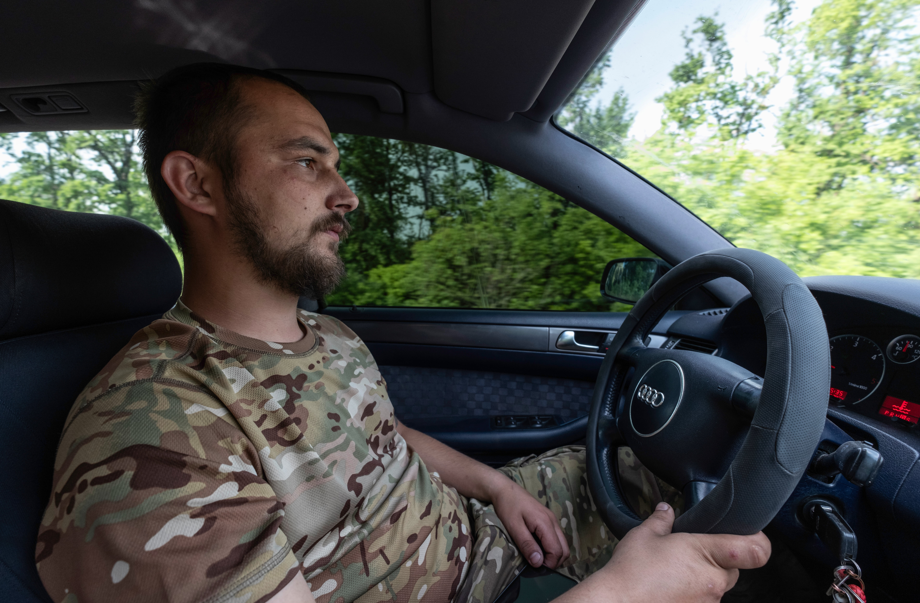
Deminer "Salyut" has 5 years of combat experience (photo provided by the press service of the 93rd Brigade "Kholodnyi Yar")
That's why a deminer must know how to shoot, hold positions, advance and retreat, and defend themselves. They carry the same equipment as the infantry, except the deminer also has to carry mines. For example, an anti-personnel mine weighs at least 2 kilograms, and sometimes you need to carry 10-12 of them in a backpack. An anti-tank mine weighs 10-12 kilograms, depending on whether it's Soviet or American. We have different kinds. And then there’s the body armor, rifle, and cartridges, which add up to several more kilograms.
A deminer must perform maneuvers quickly and efficiently. If they aren't agile, they’re as good as dead.
It's hard to lose people, but without losses, the job can't be done. In my demining unit, only four have been killed during the full-scale war. This is the lowest loss rate, but there are wounded. Such a result doesn't depend on the equipment we work with; it’s just that other units lack qualified officers for work.
We don’t have days off. Sometimes we sleep just two hours over two or three days. No one else will do this work, and lives depend on it. But we're still fortunate because we move from place to place, while the infantry is constantly in the trenches.
_1.jpg) Soldiers of the 93rd Brigade "Kholodnyi Yar" (photo provided by the press service of the 93rd Brigade "Kholodnyi Yar")
Soldiers of the 93rd Brigade "Kholodnyi Yar" (photo provided by the press service of the 93rd Brigade "Kholodnyi Yar")
We mine everything - from phones to nine-story buildings
The hardest part of my work as a deminer is patience. Sometimes the work itself takes 5 minutes, but you have to wait 2-3 days to complete the task. We mine all the entrances and exits to the position. Sometimes we can go and check every few hours, depending on the situation on the battlefield - whether we are losing or attacking.
A deminer needs to know how to place a mine correctly. You need to follow simple principles and not overcomplicate things. Even a standard method from the Soviet Union era is 100% effective, but if you overthink something, it might explode in your hands at some point.
We mine various things - cars, laptops, phones. We even blew up nine-story buildings while retreating from Bakhmut. Our battalion was one of the last to leave; there was no way to hold the defense anymore, and the Russians were firing from the second floor, so we also needed to "lower" the nine-story building - we blew it up.
The fact that the Russians mine even cemeteries makes sense because they need to block the enemy's access to positions. Over two and a half years of war, they have learned to use our tactics against us. You can't learn this anywhere else except on the battlefield.
.jpg)
Fighters of the 93rd "Kholodnyi Yar" Brigade (photo provided by the press service of the 93rd Brigade "Kholodnyi Yar")
There is a lot of talk about mine-laying drones now. They work at long distances, requiring at least two crew members to sit behind the lines and control them. These drones cost from 300,000 hryvnias (around $7,300) and weigh 150-200 kilograms. So, if something happens to it, or if the battery needs to be replaced, it's very difficult to carry it yourself. Therefore, a ground drone is a 50/50 solution - it might work, or it might not. It's simpler with quadcopters. But it's still better to have two soldiers controlling a drone and working on the enemy from a few kilometers away than sending 10 infantrymen on a mission.
Mostly, our guys chip in to repair equipment or buy parts to improve something. Volunteers also help, but sometimes while we wait for the collection to be completed, some people might not make it.
.jpg)
"Salyut" has been awarded the Badge of Honor and the Commander-in-Chief's Honorary Badge of the Armed Forces of Ukraine (photo provided by the press service of the 93rd Brigade "Kholodnyi Yar")
.jpg) "Salyut" has been awarded the Badge of Honor and the Commander-in-Chief's Honorary Badge of the Armed Forces of Ukraine (photo provided by the press service of the 93rd Brigade "Kholodnyi Yar")
"Salyut" has been awarded the Badge of Honor and the Commander-in-Chief's Honorary Badge of the Armed Forces of Ukraine (photo provided by the press service of the 93rd Brigade "Kholodnyi Yar")
Either we defend our country, or we will have to fight for others
Right now, there is a significant shortage of personnel. A person cannot learn in three months what I mastered in four years and applied on the battlefield for five years. Even though my comrades call me a Google encyclopedia, I still need to learn a lot because there are many different types of equipment. It's comparable to cars. Someone who repairs Audis will make many mistakes when they start working on a Ford. So, you need to focus on one field and continuously learn.
People have been very intimidated by the war; they are afraid to serve. I agree with our battalion commander. He says that if everyone flees the front and goes to Lviv, and we lose the country, then some Ukrainians will have to fight for Poland, and others - for Russia. Therefore, we either stand for our state or hide like cowards.
You can't predict where you will die - you can sit in Kharkiv or Lviv, but a rocket might strike there. For example, my godmother volunteers at the front, and when she was at home in the Kharkiv region, a missile hit - a thirteen-story building completely collapsed. She was lucky because she was hiding in the bathroom on the top floor and survived.
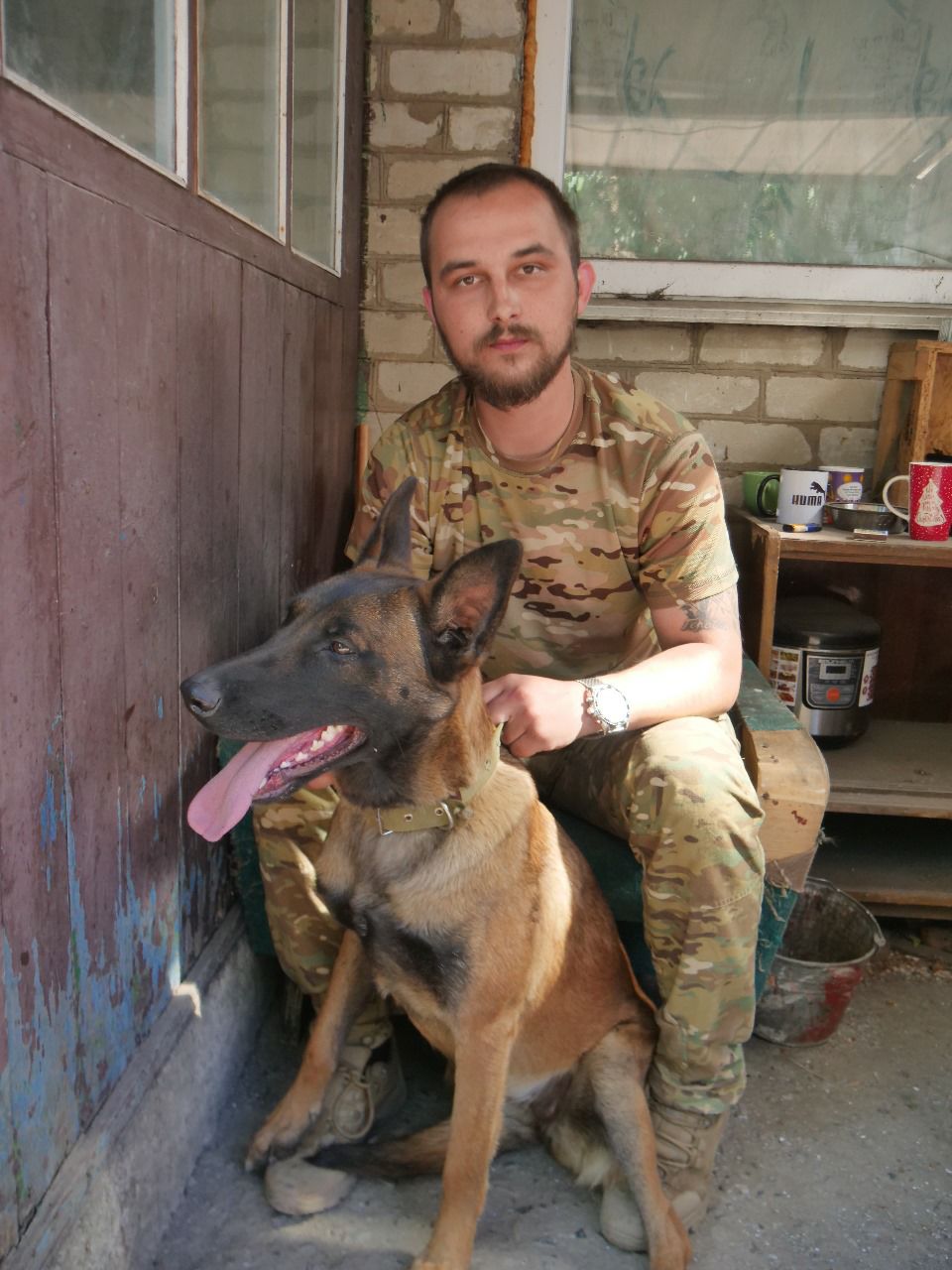
"Salyut" with a service dog (photo provided by the press service of the 93rd Brigade "Kholodnyi Yar")

